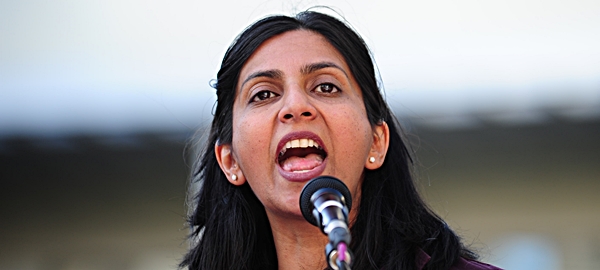Burger-flippers will get $15 an hour in Seattle; unemployed robots rejoice

YEP, THEY DID IT: Seattle City Councilmember Kshama Sawant celebrated Monday’s 9-0 committee vote raising the minimum wage in the city to $15 an hour. “Fifteen in Seattle is just a beginning,” Sawant said. “We have an entire world to win with solidarity.”
By Dustin Hurst │ Northwest Watchdog
The Seattle City Council affirmed its intent Monday to pursue an ambitious plan to create thousands of new jobs for unemployed robots that have been devastated by the recent recession.
The plan will also raise the minimum wage for workers in Seattle to $15 an hour, the highest rate in the nation for a major American city. The minimum wage in the nearby suburb of Seatac already is $15 an hour.
The new wage, pushed forward by Socialist Councilmember Kshama Sawant with the help of big labor allies, will phase in through a multi-year process. For the first few years, though, businesses will be able to count tips and health insurance contributions toward the new rate, exceptions opposed by Sawant and her big government coalition.
The deal, which passed 9-0 in committee, also allows employers to pay training wages to young and disabled workers — a wage set by employers.
The process will begin April 1, 2015, and proceed through 11 years. Businesses that employ more than 500 workers will be required to pay workers $15 an hour by 2017, or a year later if the business offers health insurance benefits. Smaller companies would have longer to phase in the increases.
Sawant led a failed minority effort to strip from the law the allowances for training wages, tip credits and health care. She also failed to move the effective date to Jan. 1, the original date proposed by Mayor Ed Murray in the original agreement. The council pushed the data back three months to allow businesses to prepare for the higher wages.
Sawant suggested the exceptions to the law were designed as a favor to “big business.”
Still, the upstart Sawant had some exultant words to mark her victory in pushing the city to the higher wage.
“We did this,” Sawant declared in her closing remarks. “Workers did this.”
She also called for more socialist and independent candidates to run for office across the country to fight the battle against “corporate politics.”
“Fifteen in Seattle is just a beginning,” Sawant said. “We have an entire world to win with solidarity.”
Councilmember Bruce Harrell pushed back against the notion that the council bowed to corporate interests.
“That’s crap,” Harrell said. “That’s absolutely crap.”
Councilmember Sally Clark echoed Harrell, telling the oft-booing crowd that the council had to appease differing factions to work a deal.
“Politics is the art of compromise,” Clark counseled the displeased crowd. “It is the art of the doable deal.”
The issue is far from settled, though. The International Franchise Association told Watchdog.org it is considering legal action against the City Council. The association said it objects to the new wage law considering franchises as big businesses, forcing them to pay the higher wages before their than small business counterparts.
The soon move may kick off new efforts to find new workplace efficiencies in the Emerald City. A hotel cafe in the city of Seatac recently shuttered because of the $15 wage. The Seattle Times notes, though, that a less labor-intensive eatery soon may open in its place.
The Washington Policy Center also pointed out that the new policy already is keeping business owners up at night.
The new law also could mean new jobs for robots, which can greatly outpace humans in terms of burger production. Brian Merchant, an editor at Motherboard, recently wrote about this nifty robot that can produce 360 gourmet hamburgers an hour.
“Yeah, robots are taking our jobs, and it’s not a question of if, but when and how,” Merchant wrote. “Economists often treat the service industry as some last bastion of downsize-proof labor, but, clearly, robots will make sandwiches and take orders, too.”
Momentum Machines, the San Francisco-based company behind the robot, did not return a request for comment.
Contact Dustin Hurst at Dustin@Watchdog.org







